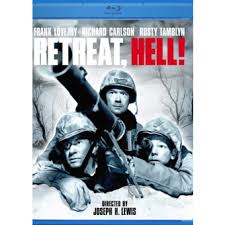
RETREAT, HELL!
US, 1952, 95 minutes, Black and white.
Frank Lovejoy, Richard Carlson, Anita Louse, Russ Tamblyn.
Directed by Joseph H. Lewis.
Retreat, Hell! is one of the many films made in the early '50s about the Korean War. The films made at the time tended to be morale-boosters, e.g. Mission Over Korea, The Steel Bayonet. Later films were able to assist the war and its impact on Asia and the United States e.g. The Bridges at Toko Ri. The Hunters, Pork Chop Hill. This film was made by Joseph H. Lewis, an action director who has become a cult figure in later decades. His film such as My Name Is Julia Ross and The Halliday Brand have been re-assessed and considered as minor classics. This is a competent well-made action war film with the collaboration of the United States Information Services and the forces. It has good performances, good war scenes - and is in the tradition of the conventional American war
film.
1. The impact of a film about the Korean war in its time? Now? Morale-boosting? An accurate picture of the United States? Its morale-boosting - but the picture of a defeat and America's not being able to cope in Korea?
2. The traditions of the war film? The background of the protagonists in their civilian life, training, action, crises in action? The film's use of background material? Documentary? Newsreel?
3. Black and white photography, American sequences, the re-creation of the atmosphere of Korea? Special effects, especially for the battle sequences? Musical score?
4. A picture of episodes in the Korean war? Its impact on the United States in the light of World War Two? The recalling of old Marines? The training of the younger men? The hard-hitting training? The details of training? Embarkation for Korea? Groups on the march? Action? Fear? Death and injury? The encounter with the Koreans and their reaction to the Americans? Chinese troops? The impasse in the war? The significance of the title? The work of Macarthur?
5. The presentation of the range of leading men? The Commander and his tough attitudes, leading his men in action, his wise understanding of how they reacted? The friendship between Hansen and Corbett? The family man leaving his family? Re-training? Exercising leadership in action? Initial clashes with authority? McDermott? as the eager young man? Stepping out for training and being humiliated? His bouncy eagerness? His fear under fire? His looking for his brother? His death? The special mission and his becoming a marine? Conventional types - well presented?
6. The details of training? Training and action in Korea? The special missions? The presence of death? McDermott’s? brother?
7. Themes of heroism, courage, endurance? Comradeship in arms?
8. The comment on the Korean war in the light of subsequent American history and American involvement in Asia? The value of this kind of film as echoing the spirit of the times? A gauge for measuring historical interpretation?